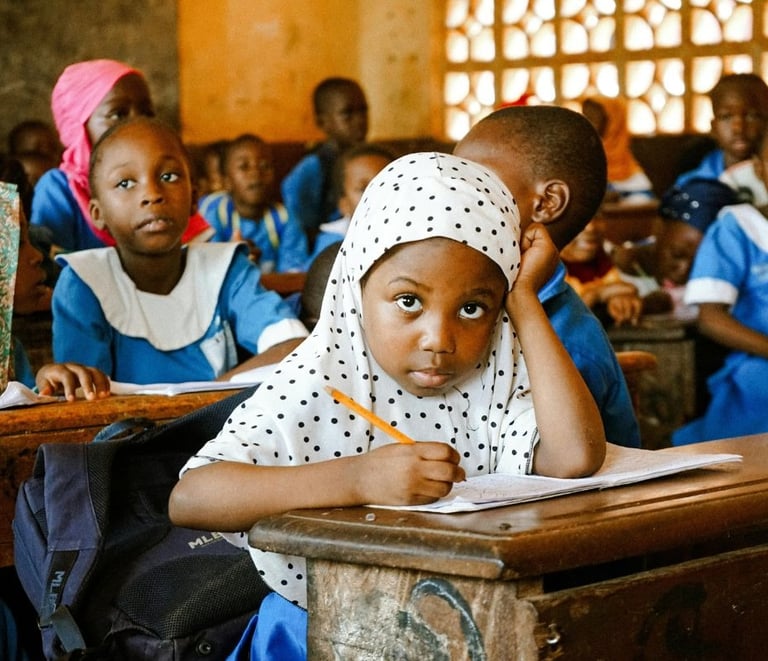Repositioning Early Childhood Education in Rural Communities: Lessons from the Field
Early childhood education (ECE) plays a pivotal role in shaping cognitive, emotional, and social development. This paper draws on insights from a recorded podcast conversation with Gyamesi Augustina, an early childhood educator in the Ashanti Region of Ghana, to illuminate persistent gaps in early learning delivery and explore community-centered, policy-relevant solutions.
Dr. Somachi Kachikwu
5/7/20253 min read


Abstract
Early childhood education (ECE) plays a pivotal role in shaping cognitive, emotional, and social development. Despite global efforts to enhance access to quality early learning, rural communities in many parts of Africa continue to face stark inequities in the provision of ECE. This paper draws on insights from a recorded podcast conversation with Gyamesi Augustina, an early childhood educator in the Ashanti Region of Ghana, to illuminate persistent gaps in early learning delivery and explore community-centered, policy-relevant solutions. The analysis advocates for a systemic reevaluation of ECE in rural areas and provides actionable recommendations for strengthening teacher training, resource provision, and community engagement.
1. Introduction
The early years of a child’s life are critically formative. According to UNESCO (2017), early childhood care and education “lays the foundation for lifelong learning and development” (p. 3). Yet, for many children in rural African communities, this stage is either poorly understood or grossly underfunded. This paper centers the lived experiences of Gyamesi Augustina, a kindergarten teacher with over 18 years of experience in Ghana, to examine the structural, cultural, and pedagogical gaps in rural ECE delivery. Through a narrative inquiry approach grounded in practitioner testimony, the study aims to reframe rural ECE as a site of urgent policy attention.
2. Background: The State of ECE in Rural Ghana
Though Ghana revised its national curriculum in 2019 to emphasize play-based learning, foundational literacy, and numeracy (Ghana Education Service, 2019), implementation remains inconsistent in rural areas. Augustina’s reflections reveal an enduring marginalization of ECE, particularly in public schools where underqualified teachers are assigned to kindergarten classes, often as a disciplinary or logistical afterthought. The professional identity of early childhood educators remains stigmatized—viewed as babysitting rather than specialized instruction.
3. Key Challenges Identified
3.1 Teacher Training Gaps
Despite specialized diploma pathways in early childhood education now being available in Ghana’s teacher training colleges, Augustina notes that rural placements frequently ignore these distinctions. Teachers without adequate pedagogical grounding in ECE are posted to kindergartens, resulting in ineffective instruction, poor classroom management, and weak developmental monitoring.
3.2 Material and Technological Deficits
Most rural ECE classrooms lack essential teaching and learning materials—exercise books, writing tools, manipulatives, and visual aids. Technology integration is virtually nonexistent. Augustina reports using her personal phone to display images and play educational songs via Bluetooth, underscoring a stark digital divide.
3.3 Policy Misalignment: Automatic Promotion
The “no repetition” policy in Ghana’s education system mandates automatic progression from one grade to the next, irrespective of learning outcomes. As a result, children advance from kindergarten to Year One without mastering basic phonics, letter recognition, or number sense—transferring learning gaps to upper primary.
3.4 Parental and Community Perceptions
Kindergarten is still widely perceived as child-minding rather than foundational education. This results in low attendance, minimal at-home support, and poor investment from stakeholders. The term “Otakara”—meaning "where children eat snacks" in Nigerian communities—aptly reflects the broader cultural undervaluing of ECE.
4. Community-Driven Solutions
Augustina’s experience highlights grassroots pathways for change. Notably, when parents witnessed academic progress in their children, they became more engaged—donating carpets, markers, and hygiene supplies. This suggests that consistent teacher quality and visible student outcomes can catalyze local support.
She also emphasizes the need for school leadership to assign passionate, energetic teachers to kindergarten classes—not those deemed less capable or merely in need of lighter workloads. Stakeholder sensitization at all levels (parents, school heads, local officials) is vital for reorienting how ECE is perceived and delivered.
5. Recommendations
Grounded in the lived experiences from this case, the following interventions are recommended:
5.1 Reform Teacher Assignment Policies
Only teachers with specialized ECE training should be posted to kindergarten classrooms. Where such expertise is lacking, ongoing in-service training and coaching should be mandatory.
5.2 Invest in ECE Infrastructure and Learning Materials
Government and development partners must prioritize the provision of developmentally appropriate learning tools, print materials, and technology for rural ECE classrooms. Smart boards, projectors, and child-friendly media can enhance play-based instruction.
5.3 Restructure Promotion Policies with Diagnostic Tools
Rather than abolishing grade repetition entirely, schools should be equipped with diagnostic tools to identify readiness and provide targeted interventions, especially in foundational literacy and numeracy.
5.4 Expand Community Awareness Campaigns
Ministries of Education should lead media and grassroots campaigns to educate caregivers on the long-term benefits of ECE. Collaborations with churches, traditional rulers, and local influencers can strengthen community buy-in.
5.5 Improve Monitoring and Support Systems
District education offices should implement rigorous and supportive supervision protocols to ensure curriculum fidelity and identify struggling teachers. Regular refresher workshops should be reintroduced, especially in rural districts.
6. Conclusion
Early childhood education is not optional; it is foundational. The marginalization of ECE in rural communities, as revealed through Augustina’s testimony, is both a social justice and economic development issue. Her voice—representing thousands of rural educators—is a call to action. It is time to re-center early learning within education reform efforts, recognizing that the road to sustainable development begins in the kindergarten classroom.
References
Ghana Education Service. (2019). Curriculum Framework for Kindergarten to Basic 6. Accra: Ministry of Education.
UNESCO. (2017). Early Childhood Care and Education: Global Report. Paris: UNESCO.
World Bank. (2021). Improving Learning Outcomes in Ghana: Education Sector Analysis. Washington, D.C.: The World Bank.
Inspiration
Empowering educators to transform rural education together.
Call Us
Subscribe to Our Newsletter
Info@classdismissedpod.com
You can reach us at +1 (240) 918-1973
© 2025. All rights reserved.
Email Us
Stay updated with the latest episodes and educational insights from Dr. K.
